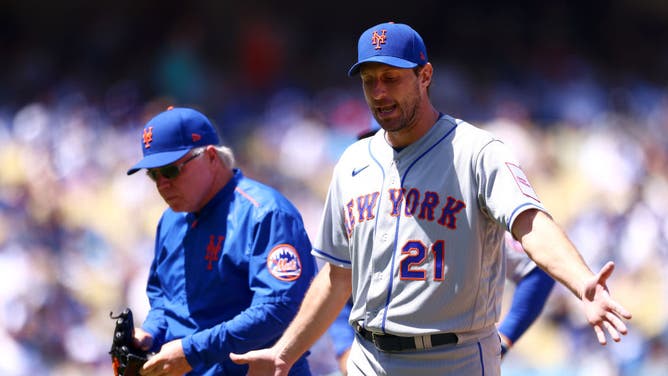Max Scherzer Ejected In 4th Inning After Sticky Substance Check
The New York Mets lost superstar starter Max Scherzer early in Wednesday's game at Dodger Stadium.
Scherzer repeatedly faced off with umpires during the game over their league mandated sticky substance checks.
Initially, the checks resulted in Scherzer being asked to change his glove.
The superstar starter was clearly unhappy with being asked to change equipment, but did comply and went back out for the bottom of the 3rd inning.
The situation escalated in the bottom of the 4th inning, however, as umpires checked Scherzer again, resulting in an ejection.
The Mets starter repeatedly asserted that he was simply using rosin, which is legal under MLB rules.
Umpires didn't seem to believe him, however.

LOS ANGELES, CALIFORNIA - APRIL 19: Max Scherzer #21 of the New York Mets reacts after an ejection by umpire Phil Cuzzi #10 during the third inning against the Los Angeles Dodgers at Dodger Stadium on April 19, 2023 in Los Angeles, California. (Photo by Katelyn Mulcahy/Getty Images)
MLB Crackdown Gets Scherzer Tossed
MLB has made a point of increasingly invasive substance checks, as spin rates have crept up again after the initial crackdown.
This ejection though, contrasted with another recent substance check, where Yankees pitcher Domingo German didn't comply with umpire requests.
Except in that situation, the opposing manager was ejected, not the pitcher.
It's also notable that the check came at Dodger Stadium, where Scherzer pitched in the second half of the 2021 season.
While it didn't seem like the request came from the Dodger dugout, obviously the team would be familiar with Scherzer's substance use.
The ejection wound up not affecting the Mets fortunes in the game, as they held off a team of Dodgers minor league players to win 5-3.
After the game, Scherzer’s agent Scott Boras issued a statement criticizing MLB’s rules and enforcement.
He does have a point; MLB should clarify exactly how these rules are determined and how umpires should enforce them.
If Scherzer was telling the truth that about simply using rosin, it makes the ejection even more unjustifiable. Although as we know, fans are frequently known for paying to see umpires, not athletes.